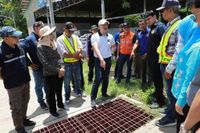On May 9, 2025, officials from the Protected Areas Regional Office 12 (Nakhon Sawan) reported a significant discovery in the Huai Tab Selao - Huai Rabam Wildlife Sanctuary. Utilizing drone technology, they spotted a herd of 13 wild elephants foraging in the rich ecosystem of the area. This finding underscores the sanctuary's status as a vital habitat not only for elephants but also for other protected species, such as the red cow.
The wildlife sanctuary, located in central Thailand, boasts an abundance of natural resources. The lush environment serves as both a food source and a water supply for the elephants and other wildlife. The area has been recognized for its ecological diversity, reflecting the health of the ecosystem within the sanctuary.
According to the post from the "Department of National Parks, Wildlife and Plant Conservation," the use of drones in wildlife monitoring has proven effective, allowing officials to survey vast areas without direct human interference. This technology not only enhances the efficiency of wildlife management but also minimizes risks associated with potential encounters between humans and wildlife.
"The area is a prime example of biodiversity and ecological integrity, showcasing the coexistence of various species," officials noted in their report. They emphasized the importance of maintaining such habitats for the conservation of wildlife.
In a related development, on the same day, Mr. Siripong Chiao Samut, the Director of the Organization for Government Affairs, met with officials to expedite the construction of artificial reefs and conservation stations along the coast from Laem Tan to Phu Kradung. This initiative is aimed at enhancing marine biodiversity and supporting tourism, especially ahead of the monsoon season.
During the inspection at Phu Kradung National Park, Mr. Chiao Samut expressed the urgency of these projects, stating, "We need to ensure that these developments are completed before the onset of the monsoon. They will not only benefit tourism but also help protect our marine ecosystems."
Officials discussed plans for artificial reef construction and the establishment of learning centers in the area, with the aim of educating the public about marine conservation. Mr. Prayoon Aranyarut, Deputy Director-General of the Department of National Parks, coordinated the meeting, bringing together various stakeholders to ensure a comprehensive approach to conservation.
In addition to the ecological benefits, the construction of these reefs is expected to create new opportunities for local communities, enhancing their economic prospects through sustainable tourism.
"Our goal is to create a balance between tourism and conservation. We want to ensure that the local community benefits from these projects while also protecting our natural resources," Mr. Chiao Samut added.
As part of the preparations for the upcoming projects, officials are also focused on managing traffic and waste in the area to minimize environmental impacts. They are committed to ensuring that the construction process respects the surrounding ecosystem and adheres to environmental regulations.
Furthermore, on May 8, 2025, officials conducted a thorough inspection of Shark Fin Bay at Koh Thap Selao - Koh Ra Bum, where they noted the area’s significance as a breeding ground for various marine species, including sharks and whales. The inspection revealed a thriving marine ecosystem, but officials raised concerns about the potential risks posed by fishing activities in the area.
"Shark Fin Bay is crucial for marine biodiversity. We must take steps to protect it from overfishing and other harmful practices," officials stated. They reiterated their commitment to conserving the marine environment and ensuring sustainable practices are adopted by local fishermen.
In light of these developments, the Protected Areas Regional Office 12 is actively working on strategies to protect marine life while promoting responsible tourism. The office aims to collaborate with local communities to foster awareness and support for conservation efforts.
As these initiatives unfold, the local government is also preparing to present detailed plans for the construction of a cable car system at Phu Kradung National Park on May 21, 2025. This project aims to enhance accessibility to the park, attracting more visitors while ensuring that environmental impacts are minimized.
Mr. Siripong Chiao Samut, who recently assumed his role as Director, emphasized the importance of this project for the region. "Phu Kradung is a key destination for both nature lovers and tourists. We want to create a magnet that draws people in while preserving the beauty and integrity of the area," he said.
The upcoming cable car system is expected to facilitate easier access to the park’s stunning vistas, but officials are mindful of the environmental considerations involved. They are determined to engage with local communities and stakeholders to address any concerns and incorporate feedback into the planning process.
Overall, the recent discoveries and ongoing projects highlight the commitment of Thai officials to preserve the nation’s natural heritage while promoting sustainable tourism. The integration of advanced technology in wildlife monitoring and the proactive measures taken for marine conservation reflect a growing awareness of the importance of ecological balance.
As these initiatives progress, they serve as a reminder of the vital role that conservation plays in maintaining biodiversity and supporting local economies. The efforts to protect Thailand’s unique ecosystems are not only crucial for wildlife but also for the communities that depend on them.




